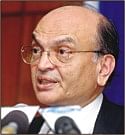Political transition must be smooth to save economy

The World Bank (WB) yesterday said Bangladesh's economy would be affected unless a smooth political transition takes place through election, but it would continue to support the country's development agendas.
"If the political transition does not happen as predicted, any uncertainty is going to affect the economy, private sector and investor confidence," said Praful Patel, WB vice-president for South Asia.
Patel was speaking at a press conference yesterday at the end of his two-day visit to Dhaka.
During his visit, Patel met with Chief Adviser Fakhruddin Ahmed and other advisers to discuss the government's wide-ranging governance and economic policy reform agendas including holding of a general election.
The WB official also met with the Chief of Army Staff General Moeen U Ahmed.
"A smooth political transition would be good for all," he said, adding that everybody would prefer not to go back to the pre-1/11 situation.
Referring to his talks with the "key players" of the caretaker government, Patel said the electoral roadmap is on track as voter registration and reforms in election rules by the Election Commission have been put in place for a better election.
"We are in the business of continuing our support to developmental agenda of Bangladesh. We did it before. We did it during the transition period with the caretaker government. We will continue to do so," he said, adding that the WB works with the country, not with any particular government.
Patel also talked on the impact of the rise of prices of fuel and food on poor people, issues of climate change and the conditions the WB is blamed for tagging with its loans.
He claimed that the WB now does not tag any condition while sanctioning loans to any country.
"Those days are gone. We do not do it anymore. We do not have any relationship which is driven by conditionalities," he said, adding that the WB, however, now wants designs of projects if it is related to road.
Patel said Bangladesh needs to address some critical issues such as keeping the reform agenda forward, increasing investment in human resources, developing infrastructure, improving agriculture productivity and tackling the impact of climate change.
He referred to food security issues and said, "The sharp rise in food prices has had serious impact on food consumption and nutrition level of poor people in Bangladesh. It is crucially important that the significant gains in poverty reduction achieved here are not eroded by high food prices."
He said the WB has created two funds to address the global food crisis and Bangladesh qualifies for the food crisis respond fund.
Replying to queries on the issues of his discussion with Moeen U Ahmed, Patel said he was presented the roadmap for the elections.
"What he [Moeen] has said about staging the election in next December is a commitment that he is going to fulfil. He also basically explained all of the necessary groundwork to ensure an election, Patel said, adding that the Army chief also informed him about the dialogue.
Asked why he met with Moeen, he said the WB does not get involved in politics and he met the army chief to discuss climate change and regional integration.
"Without endorsement and support from all of the key players these two agendas will not move forward. On advice of locals, we met on the agenda, for example, regional integration. It was suggested that it will be good to brief the General about what the regional integration means," Patel said.
He said South Asia is the least integrated region in the world. But a better integration of trade will benefit the countries in the region.
Patel, who is retiring next month after spending 35 years with the WB, said this visit will be his last as the WB vice-president.
"Over the last five years I have visited Bangladesh 15 times," Patel said. "And every time I come back here I am always impressed by the extraordinary resilience and spirit of the Bangladeshi people. I have also witnessed some remarkable achievements. Its decade-long rapid economic growth has led to a significant reduction in poverty rates and impressive progress toward several other MDGs. I am eagerly looking forward to Bangladesh achieving the middle income country status sooner rather than later.”

 For all latest news, follow The Daily Star's Google News channel.
For all latest news, follow The Daily Star's Google News channel. 



Comments